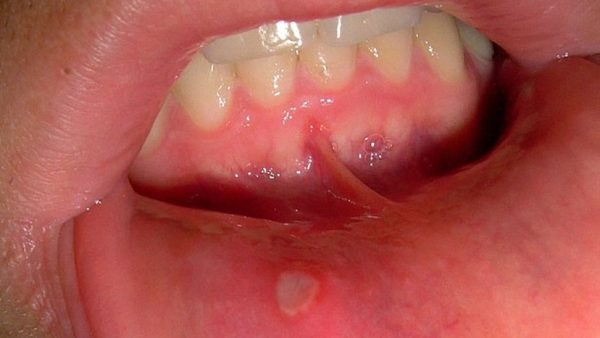
Canker Sores Symptoms And Prevention
Canker sores, also known as aphthous ulcers, can develop due to several reasons, and while there is no one-size-fits-all remedy, there are several strategies to alleviate discomfort and speed up the healing process.
Canker sores develop inside the mouth, including the inner lips, cheeks, gums, tongue, and the roof of the mouth. Unlike mucocele, Canker sore will cause pain and can result in puss formation.
Symptoms of Canker Sores:
- Pain: Canker sores often begin with a tingling or burning sensation, followed by a painful, round, or oval sore.
- White or yellowish center: The sore may have a white or yellowish center with a red border.
- Size: They can vary in size from a small pinpoint to larger than a centimeter in diameter.
- Duration: Canker sores typically last about one to two weeks before healing.
Reasons for Canker Sore Development:
- Minor Trauma: Accidental biting of the inside of your mouth, aggressive tooth brushing, or dental work can cause canker sores.
- Food sensitivities: Certain foods, particularly acidic or spicy ones, may trigger canker sores in susceptible individuals.
- Stress: Emotional stress or anxiety can weaken the immune system, making you more prone to developing canker sores.
- Hormonal changes: Women may experience canker sores during hormonal fluctuations, such as menstruation.
- Nutritional deficiencies: Lack of essential nutrients like vitamin B12, iron, and folate can contribute to canker sore formation.
- Genetics: Individuals may be genetically predisposed to developing canker sores.
Remedies for canker sores:
- Topical treatments: Over-the-counter products like numbing creams or gels containing benzocaine or lidocaine can provide temporary relief from pain and discomfort.
- Saltwater rinse: Gargling with warm saltwater helps to reduce inflammation and promote healing. Mix one teaspoon of salt in a glass of warm water and rinse your mouth several times a day.
- Avoid irritants: Stay away from spicy, acidic, or rough foods that can aggravate the sore. Also, avoid chewing gum or using toothpaste that contains sodium lauryl sulfate (SLS), as it can exacerbate irritation.
- Baking soda rinse: Like saltwater, rinsing your mouth with a solution of baking soda and water can help neutralize acids and soothe the sore. Mix one teaspoon of baking soda in a glass of warm water and rinse several times a day.
- Ice chips or cold compress: Applying ice chips directly to the sore or holding a cold compress against the affected area can help numb the pain and reduce inflammation.
- Vitamin and mineral supplements: If nutritional deficiencies are suspected, consider taking supplements or consuming foods rich in vitamin B12, iron, and folate.
- Stress management: Practice relaxation techniques such as deep breathing, meditation, or yoga to help reduce stress levels and boost immune function.
- Hydration: Drink a recommended amount of water to keep your mouth hydrated and promote healing.
- OTC pain relievers: Over the counter pain relievers like ibuprofen or acetaminophen can help alleviate pain and discomfort associated with canker sores.
- Maintain good oral hygiene: Brush your teeth at least twice a day and floss daily to help prevent irritation to the mouth tissues.
- Be cautious with dental products: Some toothpastes and mouthwashes contain sodium lauryl sulfate, which may contribute to the development of canker sores in some individuals. Consider using SLS-free oral care products.
- Protect your mouth: If you frequently bite the inside of your mouth or have dental appliances that irritate your oral tissues, talk to your dentist about ways to protect your mouth.
- Dietary supplements: If you suspect that a vitamin deficiency may be contributing to your canker sores, consider taking supplements after consulting with a healthcare professional.
- Professional treatment: If you experience severe or persistent canker sores and have other symptoms such as fever or difficulty swallowing, consult a healthcare professional for further evaluation and treatment options.
While these tips can help alleviate symptoms and promote healing, it is essential to consult with a healthcare professional if you have recurrent or unusually large canker sores to rule out underlying medical conditions or infections.
Image credit: Maksim, CC BY-SA 4.0 <https://creativecommons.org/licenses/by-sa/4.0>, via Wikimedia Commons
Author: Sumana Rao | Posted on: April 25, 2024
« Tinnitus Symptoms, Causes And Prevention Retinal Detachment Symptoms, Precautions and Treatment »






















Write a comment